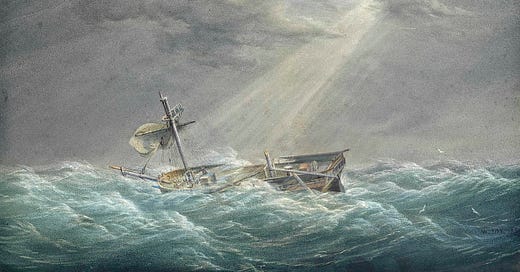No resource is more scarce, no treasure more desired, than attention. Today it is the pearl of great price, the balm of aching minds, the fragrant spiced wine in a desert of longing. It does more than satisfy: it intoxicates. Attend closely to something, anything, even for a moment, and in the same instant you will both realize you were sick, and be healed.
The sickness is a bleary delirium, a twitchy and threadbare state of mind. Its hallmark is the exhausted wakefulness that presides over a restive daily scramble from app to app. It is the podcast that plays in the ears while the eyes scan the timeline, the show that streams in the background while you brush your hair. The pleasure we get from it is a stinging and bloodshot pleasure, like gnawing at a loose tooth.
It’s common to think of this state as characteristic of the internet, a poison that enters the bloodstream via the datastream. But it is older than that: T.V. already primed our systems to receive the toxin, running in the background from commercial break to commercial break, splitting up the rhythms of the mind with its stuttering patter.
If anything the digital escalation has only heightened the fever, so that we patients realize at last that how badly we are suffering. The defining characteristic of the internet age is not distraction but the longing for a release from distraction. Its most distinctive feature is not the disease but the desire for a cure.
That cure has a price. You have to pay attention. And we feel impoverished. Attention is not something we have in abundance to give but something we crave to get, something we seek by deploying all manner of subtle and desperate devices: by learning a TikTok dance, or throwing a tantrum in the toilet paper aisle at Walmart, or writing a post on Substack about attention. Starving men have many ways of seeking food.
But attention is less like food than it is like friendship: the more frantically you try to extract it, the less pleasure it will give you, the more of it you will need. On the other hand, the more you give of it, the more you will get from it. And so what we’re all really looking for is somewhere we can put our attention where it will stick, some basin deep enough that we can pour our soul in for hours on end. Forget the ledger book and the extraction of payment. What attention really wants is what we want: to be held.
Nothing has surprised me more in my career than the request I get most often: say more. Before I started writing and podcasting online, I thought the key was bite-sized chunks of information, ruthlessly distilled. Now I realize it’s the opposite: almost every time I mention some tangent I’m forbearing to go on, some hyper-involved scholarly debate I’m leaving to the side, I get messages asking for detail.
After years trying to master the art of concision, I found myself confronted with a yearning for its opposite: what listeners and readers online most frequently say is, “ramble. Go on tangents. We’ll follow you.” The world’s most successful podcast is three hours an episode. That’s saying something: maybe what sells in the internet age is not distraction but fixation.
Not that I think all objects of attention are created equal. If I did, I’d hardly be out here trying to meme people into learning Greek and reading epic poetry. But need is opportunity. A generation of minds sick with soundbites is also a generation that will respond to richer food. The hungry sheep look up, as Milton said. The question is who will feed them.
Rejoice evermore,
Spencer




